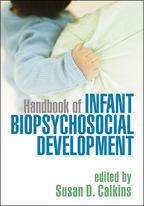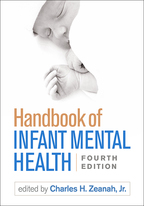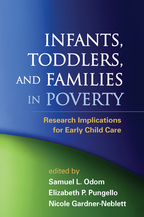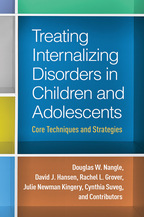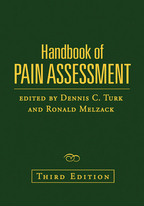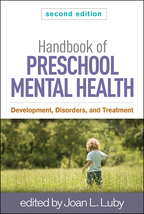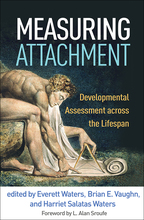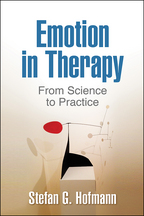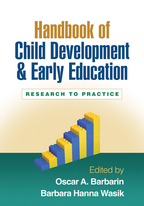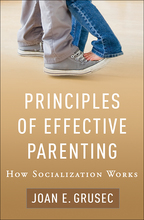Handbook of Infant Biopsychosocial Development
Edited by Susan D. Calkins
Hardcovere-bookprint + e-book
Hardcover
orderAugust 4, 2015
ISBN 9781462522125
Price: $94.00 480 Pages
Size: 7" x 10"
“Discoveries about how brain, behavior, and culture interact in infant development have been fast and furious. This handbook assembles contributions from the field’s brightest stars, who provide state-of-the-art summaries and point to a wealth of literature. The reader is at once brought up to date on stunning advances and treated to a glimpse of the future. I recommend this book highly as an exceptional reference for faculty and graduate students—perfect for provoking discussion and debate about how neuroscience, caregiving, and genetics influence infant development. The volume analyzes underlying mechanisms as well as developmental timelines, thereby pointing the way forward in infancy research.”

—Andrew N. Meltzoff, PhD, Co-Director, Institute for Learning and Brain Sciences, University of Washington
“Great strides have recently been made in understanding the underlying neural, genetic, and epigenetic mechanisms of human infant behavior. This well-organized volume provides a solid overview of current knowledge about the complexity of infant perception, cognition, and socioemotional development. Written by experts in the field, each chapter reviews the intertwined roles of biology and behavior in understanding how human development progresses over the first years of life. This would be an excellent text for an introductory graduate seminar on child development.”

—Nathan A. Fox, PhD, Distinguished University Professor, Department of Human Development and Quantitative Methodology, University of Maryland
“An important and timely work that takes on the true complexity of the study of biobehavioral development. Chapters are written by both established, renowned researchers and rising stars, and are all stellar. Anyone who seeks to understand the complex interplay of neurobiological, physiological, cognitive, socioemotional, cultural, and contextual processes in early child development will want to read this handbook. Its contribution lies as much in the careful articulation of new directions for research on early biopsychosocial development as in the incisive summary and integration of current knowledge. The book will be extraordinarily valuable for use in graduate courses in psychology, human development and family studies, public health, sociology, and social work. I very much look forward to using it in my graduate course on Developmental Science.”

—Martha J. Cox, PhD, Department of Psychology, University of North Carolina at Chapel Hill
“This volume exquisitely details the paradigmatic shift toward multilevel transactional analysis across domains of infant development. Offering conceptual depth and clarity, it will serve as a single primary source for guiding the next generation of research on novel biopsychosocial approaches to infant development. The book belongs on the shelf of every infant research lab and should be required reading for graduate students in developmental science. It will be of great interest to interventionists, not just developmentalists. The section on adversity and risk offers particularly thoughtful perspectives that should drive the development of innovative intervention programs for high-risk infants.”

—Keith A. Crnic, PhD, Foundation Professor, Department of Psychology, Arizona State University
“According to the biopsychosocial perspective, pioneered by Gilbert Gottlieb, human development is shaped by biology, behavior, and the social environment. This handbook brings together a diverse group of scholars to illustrate the power of the biopsychosocial approach. The volume presents cutting-edge research that integrates across multiple levels, from genetics to the social environment. It is important reading for researchers, academics, and advanced students.”

—Mark H. Johnson, PhD, Centre for Brain and Cognitive Development, Birkbeck, University of London, United Kingdom
—Andrew N. Meltzoff, PhD, Co-Director, Institute for Learning and Brain Sciences, University of Washington
“Great strides have recently been made in understanding the underlying neural, genetic, and epigenetic mechanisms of human infant behavior. This well-organized volume provides a solid overview of current knowledge about the complexity of infant perception, cognition, and socioemotional development. Written by experts in the field, each chapter reviews the intertwined roles of biology and behavior in understanding how human development progresses over the first years of life. This would be an excellent text for an introductory graduate seminar on child development.”
—Nathan A. Fox, PhD, Distinguished University Professor, Department of Human Development and Quantitative Methodology, University of Maryland
“An important and timely work that takes on the true complexity of the study of biobehavioral development. Chapters are written by both established, renowned researchers and rising stars, and are all stellar. Anyone who seeks to understand the complex interplay of neurobiological, physiological, cognitive, socioemotional, cultural, and contextual processes in early child development will want to read this handbook. Its contribution lies as much in the careful articulation of new directions for research on early biopsychosocial development as in the incisive summary and integration of current knowledge. The book will be extraordinarily valuable for use in graduate courses in psychology, human development and family studies, public health, sociology, and social work. I very much look forward to using it in my graduate course on Developmental Science.”
—Martha J. Cox, PhD, Department of Psychology, University of North Carolina at Chapel Hill
“This volume exquisitely details the paradigmatic shift toward multilevel transactional analysis across domains of infant development. Offering conceptual depth and clarity, it will serve as a single primary source for guiding the next generation of research on novel biopsychosocial approaches to infant development. The book belongs on the shelf of every infant research lab and should be required reading for graduate students in developmental science. It will be of great interest to interventionists, not just developmentalists. The section on adversity and risk offers particularly thoughtful perspectives that should drive the development of innovative intervention programs for high-risk infants.”
—Keith A. Crnic, PhD, Foundation Professor, Department of Psychology, Arizona State University
“According to the biopsychosocial perspective, pioneered by Gilbert Gottlieb, human development is shaped by biology, behavior, and the social environment. This handbook brings together a diverse group of scholars to illustrate the power of the biopsychosocial approach. The volume presents cutting-edge research that integrates across multiple levels, from genetics to the social environment. It is important reading for researchers, academics, and advanced students.”
—Mark H. Johnson, PhD, Centre for Brain and Cognitive Development, Birkbeck, University of London, United Kingdom

